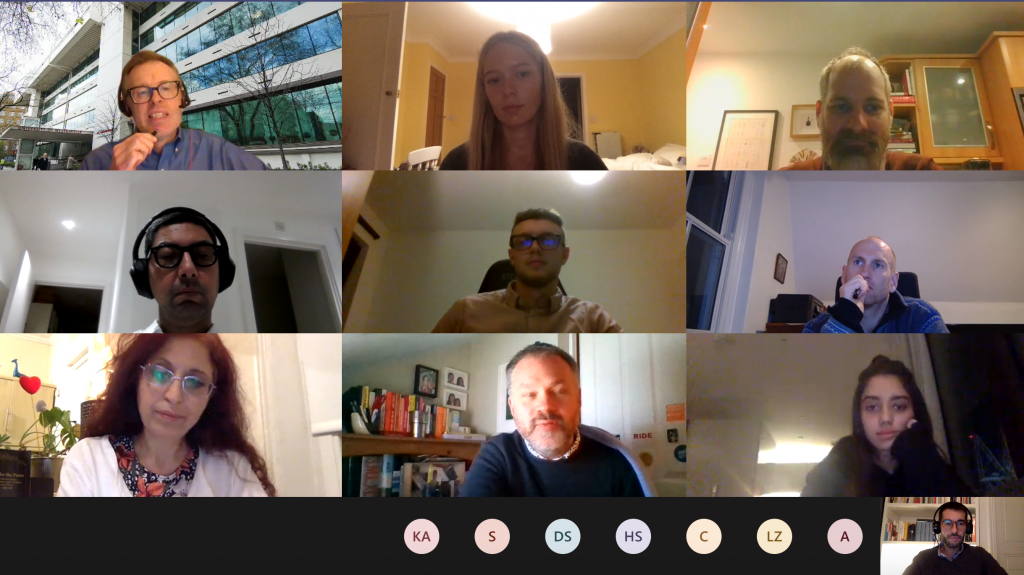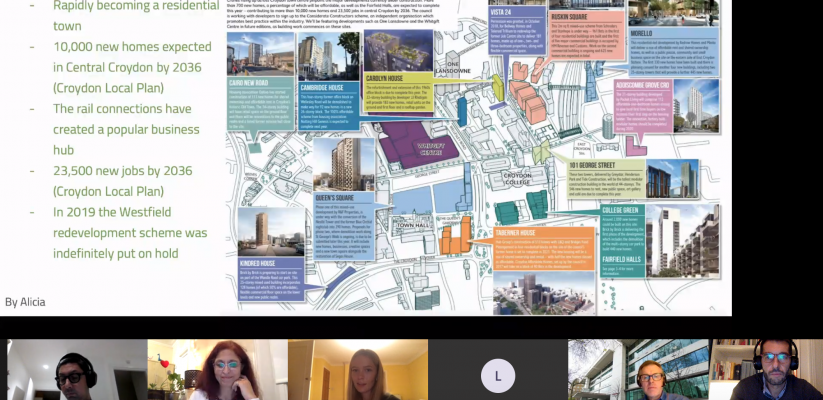Post-COVID Cities is the theme of the 2020 Industry Project set up between the BA Designing Cities at the University of Westminster and three London-based practices: Jacobs, ING Media, and WSP. After a summer of intense work, where our students collaborated with practitioners, we hold a (digital) presentation on the 8th October 2020 to show their results. The first report is on on the reappraisal of Meridien Water scheme (Jacobs) (1); the second one is on the toolkit ‘productive places’, tested in two areas of London (WSP) (2); and the the third one is on ‘digital placemaking’, using Croydon as a case study (ING Media) (3).
The discussion touched few emerging issues on how cities should be designed and planned in light of the current situation of the pandemic, in particular: the move towards a more human centred city, exploring how to reclaim a more suitable community realm and how to enhance a more sustainable mobility and active travel; the need of expanding the notion of productivity of places to include aspects of wellbeing and quality of life; and finally the suitability of tools of digital placemaking to effectively cope with the negative impact of COVID on cities, neighbourhoods, and street life.
There are some take aways from the rich discussion that followed, with the awareness that we are navigating in uncertain territories given the unpredictability of COVID. There is a genuine intention from local governments and the practice to push forward an agenda of urban sustainability, resiliency, and low-carbon emission, to respond to both global health crisis and the climate change urgency. This, however, needs to be further verified in light of the potential trade offs between public transportation systems and systems perceived as safer (active travel but also traditional car-based). There is also a question of financial viability, given the correlation between any public improvement and urban growth, today challenged by COVID itself. This point is directly linked with ways of defining and measuring ‘productivity’ of places. It is probably evident that a narrow notion of productivity will need to be revised to include a changing sets of values more linked to public health, safety, quality of life and eventually wellbeing. And finally, the explosion of social media and digital tools which are replacing our real experience of cities: while they can perfectly work in this transition phase to rebrand cities and particularly declining inner-city areas, can this be enough in the long-term?
As Carlo Castelli, Head of Cities at Jacobs, said: “In this discussion, it seems evident that, to ensure city sustainability after COVID, it will be ultimately a matter of value capturing and how we will be capable to interpret and therefore integrate changing values into our future cities‘.
The work has been coordinated by Giulio Verdini, Course Leader of the BA Designing Cities, and Jim Coleman, Professor of Professional Practice, at the University of Westminster. Jim chaired the session, and colleagues like Roudaina Alkhani and Krystallia Kamvasinou animated the discussion bringing insights from their teaching and research practice. This work will be used by students to reflect on their work experience module, and it will inform the final year exhibition in 2021.
Students and practitioners involved in the work:
(1) Ciara Clapp, Saleem Samuda, Kasem Abbas, and Hamza Sohail, with the support of Carlo Castelli, George Wade and Conor Morris at Jacobs;
(2) Daniel Sefton, Anita Feleki, and Luka Zumbach, with the support of Barny Evans and Alexandra Segall at WSP;
(3) Alicia Privett, and Leen Bafakih, with the support of Peter Griffiths at ING Media.

- POST-COVID CITIES: A DIALOGUE WITH PRACTICE - October 9, 2020
- INDUSTRY PROJECT - June 13, 2020
- DESIGNING CITIES ON-LINE - April 6, 2020
